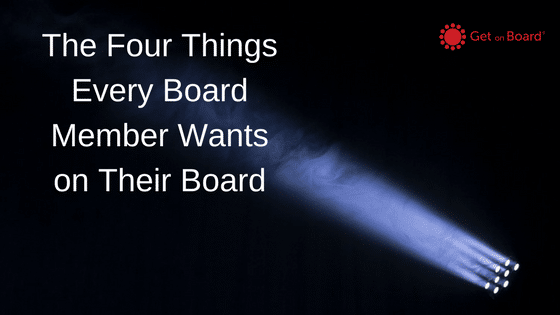The Four Things Every Board Member Wants on Their Board

The more I talk to other board members and company directors, the more I learn that there are a handful of universal elements that every board member wants to have on their board.
I’ve distilled these in to four essentials…
1. A good Chair
The person sitting in the Chair role can make or break a board (and organisation). The longer I am on boards, the more this becomes a fact. A good leader of leaders really does make all of the difference.
Effective board Chairs share many traits. These traits include: having a high IQ and high EQ, knowing when and how to engage, a passion for the organisation’s cause, having the time and willingness, and setting and reinforcing the right culture. You can read more about these individual traits in this article here.
It’s hard to know if a Chair is good before joining a board. I suggest ensuring that you meet with the Chair before you accept the position and asking them questions around these traits such as what their chairing style is, how do they manage robust discussions, what their connection to the cause is, how much time they commit to the Chair role, and what the board culture is like and how it’s reinforced and upheld.
2. Equal Workload
This has to be one of the biggest frustrations that I hear from board members from all types of boards. And it’s certainly mine too!
An unequal workload – where you have a few people doing most-to-all of the work in committees, at company events, at meetings, etc. – is not acceptable. Warm bodies around the board table do nothing for the performance of the board and organisation. In fact, they are a detriment and should be set free; particularly in organisations (such as not-for-profits and charities) where the board has significant impact on funds raised.
I encourage all boards to introduce position descriptions for all board members to ensure expectations around workload and their involvement in board and organisational activities are clearly laid out and accepted. This gives the Chair and board an accountability tool for all members of the board and is useful to revisit during the annual board and director performance review.
3. Trust
Trust is required as a foundation for effective relationships, particularly on a board. Trust requires many things to happen before it is given.
Imagine if, at every meeting, you worried that no one had prepared for the meeting and you had to do the thinking for them; or thought that every challenge to your opinion was a personal attack; or if everyone only cared about themselves and what they could get out the organisation by being on the board; or that you were afraid of the decisions your fellow board members were making (that you would be liable for) if you were absent from a meeting?
This is why trust is so fundamental on a board.
There are many ways that you can build trust. The eight Cs approach is a simple framework to follow and is outlined here. In that article you will also find four other ways to build trust that are just as useful in your professional career as they are for your board career.
4. Competence
Making a mistake in the boardroom can have extreme and serious consequences to you and others. So you are required to know what you’re meant to be doing in the boardroom and what the role and purpose of a director is (and actually do it).
It is your responsibility to understand your duties and responsibilities and how to execute them appropriately and effectively and to keep learning and developing as the world changes.
Not having adequate competence erodes people’s trust in you and reduces the performance and effectiveness of the board and, subsequently, the organisation.
There really is no excuse in not knowing how to be an effective director. There are countless articles, books, and resources available where you can learn from the best. Our recommendation (naturally) is to complete the Boardroom Bootcamp course as your first step on your board education journey.
How would you rate your board on each of these elements? How would you rate yourself? What element(s) do you see as essential for a great board?
